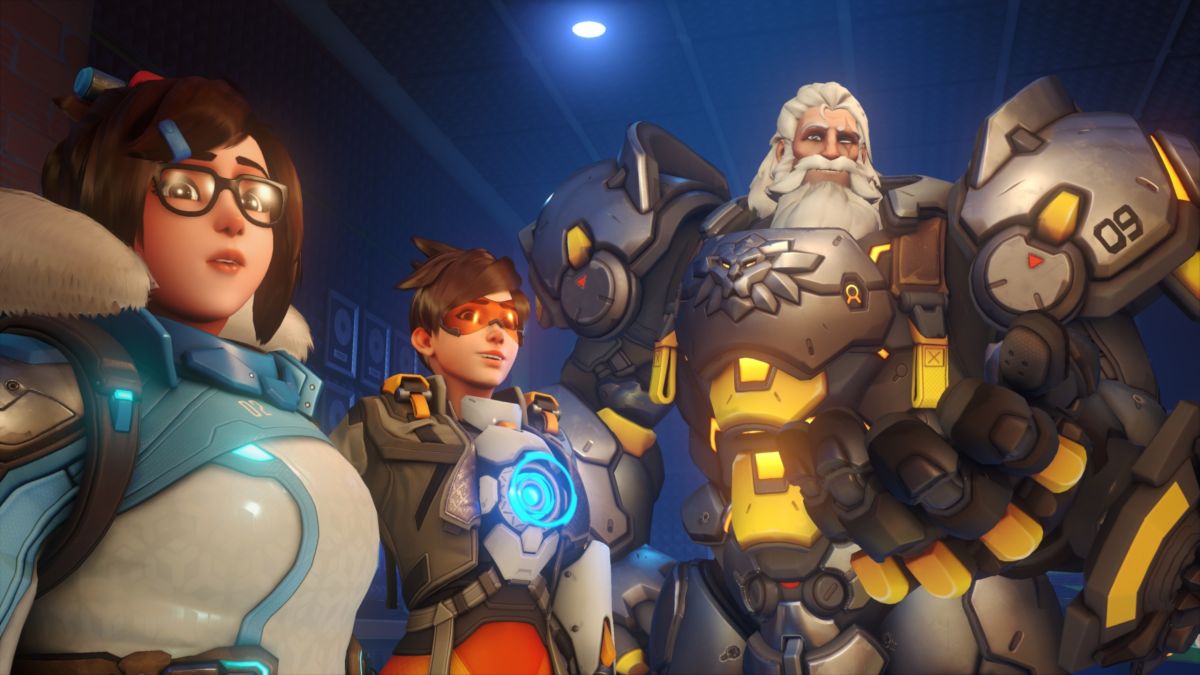
Blizzard is going to release some of its games on Steam, starting with Overwatch 2. I didn’t see that coming at all. Blizzard is a founder of modern PC gaming, with a legacy that goes back further than Valve’s, and Battle.net existed well before Steam did. Blizzard has never put a game on Steam, and it never seemed like it needed to.
Well, things have changed. When we spoke to ex-Blizzard employees about the 2021 sexism and harassment lawsuit, they said they started to feel Blizzard’s reputation collapsing in 2018. Five years later, its old leaders are gone and it’s on the verge of becoming a Microsoft company. For better or worse, it isn’t the Blizzard it used to be.
I think today’s Overwatch 2 news is as much about Valve as it is Blizzard, though. Things were mildly rocky for Valve in the mid-2010s: EA and Microsoft stopped releasing games on Steam in favor of their own launchers, Steam Machines were a dud, and it didn’t seem like Valve’s VR investment was going to pay off in the short term. Then Call of Duty left Steam, becoming a Battle.net exclusive on PC, and Epic Games, flush with Fortnite money, launched its own store and started nabbing big timed exclusives.
But Steam kept growing anyway, and with few exceptions, big publishers like EA, Microsoft, and Activision came crawlin’ back. When Sony relented and finally started putting its PlayStation exclusives on PC, they came to Steam, too. It’s now easier to ask who’s not on Steam than to ask who is.
The biggest PC games that aren’t on Steam
- Epic Games: With few exceptions, Epic’s games are only available on PC from the Epic Game Store. Aside from Fortnite, that includes games from Epic-owned studios, such as Rocket League, and games being published by Epic, like the upcoming Alan Wake 2.
- Other Epic Games Store exclusives: EGS exclusive games that aren’t owned or published by Epic itself typically have a timed exclusivity deal, and they often come to Steam when it expires. We don’t always know if or when that’s going to happen, though. The Kingdom Hearts series, for example, has remained exclusive to the Epic Games Store since 2021.
- Riot: The League of Legends spin-off games are on Steam, but League of Legends itself is only accessible through Riot’s launcher, and the same goes for Valorant. Riot’s games have been listed on the Epic Store since late 2021, but still launch the Riot Games client. (PC Game Pass subscribers get some perks, too.)
- Minecraft: Microsoft has started putting games on Steam again, but it continues to covet its cubic jewel: Minecraft’s PC versions can only be purchased directly from Microsoft.
- MiHoYo: The Genshin Impact developer does have one game on Steam, Honkai Impact 3rd, but that’s it. Genshin Impact is available in its own launcher and from the Epic Games Store.
- Meta Quest exclusives: Some VR games, like Edge of Nowhere, are exclusive to the Meta Quest Store (aka the Oculus Store).
- Single-game launchers: Some major games, such as Star Citizen and Escape from Tarkov, use their own launchers exclusively.
Many thousands of other PC games can’t be purchased on Steam, either because they can’t be purchased digitally anywhere, or because they’re hosted independently, exclusively found on stores like itch.io, or are only sold on platforms used primarily in China or other countries. So not everything’s on Steam, of course, but its library has nearly quadrupled over the past five years, most of the big players are back, and now Blizzard is joining the club.
Blizzard might withhold its most significant games, like Diablo 4 and World of Warcraft, but the addition of Overwatch 2 is still an enormous symbolic victory for Steam, vindicating some of the risky decisions Valve made around five years ago.
Valve keeps winning
Valve has made small concessions along the way to Steam’s present vitality, lowering its revenue cut to 20% for the biggest earners (which is still more than Epic’s 12% cut) and letting publishers get away with bundling their own launchers into Steam releases, but I don’t think more favorable terms are really what’s brought so many publishers back to Steam. Its gravitational pull just got too strong to resist.
What out-of-nowhere indie hits like Vampire Survivors might we have missed if games still had to wriggle through Steam Greenlight?
I was nervous when Valve introduced Steam Direct in 2017, opening Steam’s catalog to anyone with a game and $100, and stunned in 2018 when it got rid of nearly all its content and quality rules. At the time, I criticized Valve for eschewing responsibility for the games it sold. Weren’t people going to submit piles of low-effort crap to try to make a quick buck? Weren’t they going to publish hateful, nasty games just to get attention?
People definitely did and still do those things, so it ain’t a perfect system, but as business decisions go, opening up Steam was a winning move. And for all of Steam’s present day faults, I can’t in hindsight imagine that PC gaming would be better had Valve not introduced self-publishing. What out-of-nowhere indie hits like Vampire Survivors might we have missed if games still had to wriggle through Steam Greenlight? And would we have the same access we do now to, say, indie games from China?
Still, it’s probably a good thing that Epic made its Fortnite money when it did and chose to weather public anger to challenge Steam, albeit only slightly, with the Epic Games Store. As much as I like the convenience of consolidating all my games into one launcher, someone’s got to keep Gabe in check, right? The Steam Deck seems to be a big success, too, and if this string of wins keeps up, Valve might get cocky and do something reckless like release the third game in a series.
- SEO Powered Content & PR Distribution. Get Amplified Today.
- PlatoData.Network Vertical Generative Ai. Empower Yourself. Access Here.
- PlatoAiStream. Web3 Intelligence. Knowledge Amplified. Access Here.
- PlatoESG. Automotive / EVs, Carbon, CleanTech, Energy, Environment, Solar, Waste Management. Access Here.
- BlockOffsets. Modernizing Environmental Offset Ownership. Access Here.
- Source: https://www.pcgamer.com/games-not-on-steam
- :has
- :is
- :not
- $UP
- 1
- 2017
- 2018
- 2021
- 3rd
- a
- About
- access
- accessible
- addition
- again
- ago
- Alan
- All
- along
- always
- an
- and
- anger
- anyone
- anyway
- anywhere
- ARE
- around
- AS
- At
- attention
- available
- away
- back
- Battle
- BE
- because
- becoming
- been
- before
- being
- Better
- Big
- Biggest
- blizzard
- brought
- business
- but
- by
- call
- Call of
- Call of Duty
- came
- CAN
- catalog
- challenge
- changed
- check
- China
- chose
- citizen
- client
- club
- Cms
- COM
- come
- coming
- company
- concessions
- consolidating
- content
- continues
- convenience
- countries
- course
- Cut
- day
- deal
- decisions
- definitely
- Developer
- DID
- digitally
- direct
- directly
- do
- does
- don
- EA
- easier
- Edge
- either
- enormous
- EPIC
- Epic Games
- Epic Games Store
- escape
- example
- Exclusive
- exclusively
- Exclusives
- exclusivity
- existed
- false
- faults
- favor
- favorable
- feel
- few
- Finally
- five
- For
- Fortnite
- found
- founder
- from
- further
- game
- game store
- Games
- gaming
- genshin impact
- get
- Go
- Goes
- going
- gone
- good
- gravitational
- Growing
- had
- happen
- harassment
- Have
- hindsight
- Hits
- hosted
- HTTPS
- i
- if
- imagine
- Impact
- in
- includes
- independently
- Indie
- into
- introduced
- investment
- isn
- IT
- ITS
- itself
- Jewel
- joining
- jpg
- just
- Keep
- kept
- Kingdom
- Know
- Late
- later
- launch
- launched
- lawsuit
- leaders
- League
- league of legends
- left
- Legacy
- Legends
- letting
- Library
- like
- Listed
- lowering
- Machines
- made
- major
- make
- many
- Meta
- Meta Quest
- Microsoft
- might
- Minecraft
- missed
- Modern
- money
- more
- most
- move
- much
- my
- nearly
- needed
- net
- never
- news
- now
- Oculus
- Oculus Store
- of
- off
- often
- Old
- on
- ONE
- only
- opening
- or
- Other
- over
- Overwatch
- Overwatch 2
- own
- owned
- pass
- past
- Pay
- PC
- pc game
- pc games
- PC Gaming
- People
- perfect
- Platforms
- plato
- Plato Data Intelligence
- PlatoData
- players
- playstation
- Point
- present
- primarily
- probably
- public
- publish
- published
- publishers
- purchased
- put
- Putting
- quadrupled
- quality
- quest
- quest store
- Quick
- RE
- really
- reckless
- release
- Releases
- releasing
- remained
- reputation
- responsibility
- revenue
- Rid
- right
- Riot
- Riot Games
- Risky
- rocket
- Rocket League
- rocky
- rules
- s
- Said
- same
- say
- seasonal
- see
- seem
- seemed
- seems
- Series
- Short
- significant
- since
- small
- So
- sold
- some
- Someone
- something
- Sony
- Sponsored
- Star
- started
- Starting
- Steam
- Still
- stopped
- store
- stores
- String
- strong
- studios
- submit
- subscribers
- success
- such
- symbolic
- system
- term
- terms
- than
- that
- The
- their
- then
- they
- thing
- things
- Think
- Third
- this
- those
- though?
- thousands
- Through
- time
- Timed
- to
- today
- too
- true
- try
- typically
- upcoming
- use
- used
- VALORANT
- valve
- Vampire
- verge
- versions
- victory
- vr
- VR Games
- VR Investment
- Wake
- was
- Way..
- we
- Weather
- WELL
- were
- weren
- What
- when
- which
- WHO
- winning
- Wins
- with
- worse
- would
- xbox
- years
- zephyrnet









